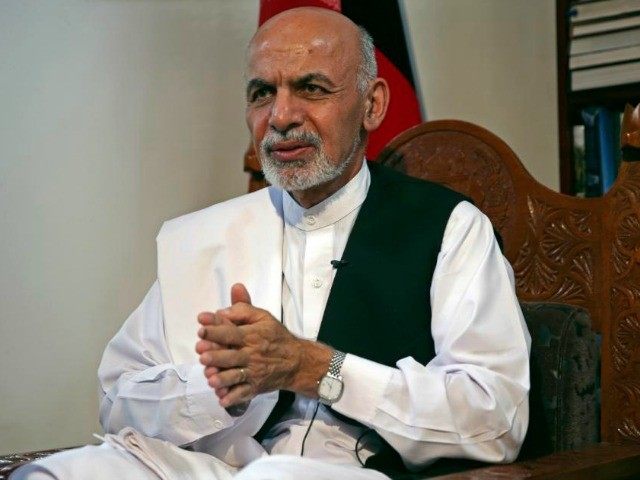Former Afghan President Hamid Karzai gave an interview to the Associated Press on Wednesday in which he pronounced Afghanistan to be in “terrible shape” and criticized the U.S. government for not doing enough to rebuild the country.
He also called upon the United States to impose sanctions against Pakistan for aiding and abetting the Taliban.
Karzai blamed the United States for creating the fractious “National Unity Government” that has governed Afghanistan since his own term in office ended in 2014. He said the National Unity Government “undermined Afghan democracy and the Afghan constitution.”
Paradoxically, Karzai exhorted the U.S. to do more and also criticized Uncle Sam for telling Afghans, “If I am not here, you will be worse off.” He appeared to be under the impression that America is eager to colonize Afghanistan and use it as a part of an elaborate strategy to maintain global dominance.
“In my view, their intention is to keep us divided and weak so they can carry on their objectives in this region. They have their global politics and rivalries. They have China as a great rising power. They have Russia as a revitalized, re-energized great power on the world scene and they feel threatened and challenged,” Karzai charged.
“We must implement our constitution and we must do all we can as a people to restore ourselves to the ownership of this country, which we don’t have right now,” he urged. “Right now it is the U.S. policy that owns it.”
He was even harder on Pakistan, which he wants the United States to punish even more than it already has for sheltering Taliban militants. Karzai specified that he wants stronger sanctions against the Pakistani intelligence and military apparatus, not military action or sanctions that would harm the “Pakistani people.”
Karzai is no stranger to dumping the problems of Afghanistan in America’s lap. In September, he asked Foreign Policy: “When the U.S. brings more planes, who are they going to bomb? Our villages and our homes.” It does not seem to have occurred to him that the U.S. military might busy itself with bombing the people who are blowing up Afghan villages and homes, the Taliban. Also, the “villages” getting bombed by the Taliban include Kabul.
Foreign Policy noted that Karzai’s complaints about U.S. involvement, and particularly about the Afghanistan strategy of the Trump administration, are considerably different from the many Afghans who welcomed continued American engagement and President Trump’s unprecedentedly tough criticism of Pakistan.
As with the contradictions in his new Associated Press interview, Karzai’s chat with FP simultaneously railed against the United States for taking so long to act against Pakistan instead of merely chastising it, while simultaneously castigating Trump for “adding to the flames of conflict in Afghanistan” by speaking too loudly. He is prone to complaining that America is not doing enough to defeat the Taliban in one breath, and insisting that meaningful negotiations with the Taliban are impossible until America gets out of the way in the next.
Karzai complains about American influence at the very moment when the U.S. government more clearly agrees with him about malign Pakistani influence than ever. He wants Pakistan clobbered with sanctions for harboring the Taliban, but insists the Taliban “belong in Afghanistan” and are “most welcome.” He reconciles that contradiction by implying the Taliban wouldn’t be so bad if Pakistan wasn’t indulging its worst factions in a bid to destabilize Afghanistan.
Karzai also has not been shy about blaming the United States for the rise of the Islamic State (ISIS), and in fact accusing America of covertly working with ISIS to keep it viable as an instrument of divide-and-conquer U.S. strategy. When the United States dropped the “mother of all bombs” on an ISIS stronghold in November, Karzai denounced it as an “inhuman and most brutal” misuse of his country as a “testing ground for new and dangerous weapons,” and then he insinuated the American military quietly helped the Islamic State escape from the worst effects of the bomb.
“I consider Daesh a tool. I do not differentiate at all between Daesh and America,” he said, using another name for the Islamic State.
American officials will likely be waiting a long, long time for Hamid Karzai to decide the policy porridge they serve him is neither too hot nor too cold, but unfortunately, he cannot be dismissed as a powerless scold grousing from the sidelines years after his official power ended. Foreign Policy noted that he retains extensive connections, which can be more important than official power in Afghanistan. The Associated Press points out that Afghans are bitter about the state of affairs in their country and prone to blaming every foreign influence, producing a deep well of anger that skillful ideologues can channel in any direction they desire.
It may come as some small consolation to Karzai to know that the Trump administration on Wednesday dropped sanctions on three individuals accused of working with terrorist groups in Pakistan, including the Taliban and allied militants.
“This is part of this administration’s broader efforts to disrupt terrorist fundraising, and we call on the Pakistani government and others in the region to work with us to deny sanctuary to these dangerous individuals and organizations,” Treasury Undersecretary Sigal Mandelker said while announcing the new sanctions.
Assistant Secretary of Defense Randall Shriver told the Senate Foreign Relations Committee on Tuesday that Pakistan has “taken some positive steps” to fight terrorism, but those steps “do not reflect the type of decisive action that is necessary to restore regional stability.”

COMMENTS
Please let us know if you're having issues with commenting.